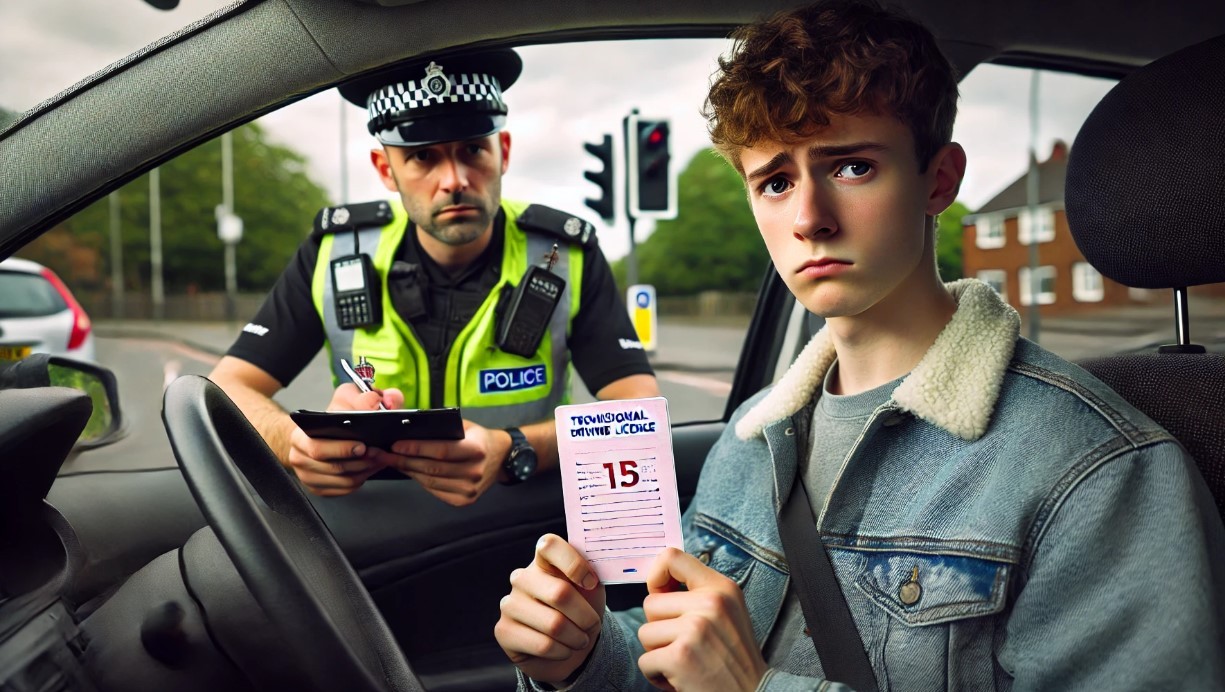The first two years following passing your driving test are crucial for new drivers in the UK. It’s during this period that you are most vulnerable to making mistakes on the road.
However, under the New Drivers Act 1995, the consequences of these mistakes can be severe. Accumulating just 6 penalty points on your licence within this 2-year period could result in the automatic revocation of your driving licence.
This rule is intended to encourage safer driving habits and reduce the number of road accidents caused by inexperienced drivers. Know about what happens if you get 6 points on your license in the first 2 years.
What does this signify, however, for you as a novice driver? How do you prevent six points for the offences that result in them? All the answers you require will be found in this extensive handbook.
What is the New Drivers Act 1995?

The New Drivers Act 1995 is a key piece of UK legislation aimed at reducing road traffic offences among newly qualified drivers. This law places stricter conditions on drivers who have recently passed their driving test.
Unlike experienced drivers, who can accrue up to 12 points before disqualification, new drivers face license revocation if they accumulate just 6 points within 2 years of obtaining their full license.
The key elements of the New Drivers Act 1995 include:
- Timeframe: The act applies for 2 years following the date you pass your driving test.
- Penalty Threshold: While experienced drivers are allowed up to 12 points before disqualification, new drivers face a stricter limit of 6 points.
- Licence Revocation: If a new driver reaches 6 points, the DVLA will automatically revoke their full driving license.
The ultimate goal of the New Drivers Act is to promote safe driving, reduce road traffic accidents, and hold new drivers accountable for their behaviour on the road.
How Does the New Drivers Act Affect New Drivers?
The New Drivers Act introduces a stricter level of accountability for new drivers. While experienced drivers have the leeway to accumulate up to 12 points, newly qualified drivers only have a buffer of 6 points before their driving privileges are revoked.
Lower Point Threshold
Unlike experienced drivers, who can accumulate 12 points before facing disqualification, new drivers only have a 6-point limit. This lower threshold means that even a single offence, like using a mobile phone while driving (which carries 6 points), can result in licence revocation.
Licence Revocation
If you reach 6 points, your licence is automatically revoked. You don’t need to attend court or be summoned, the DVLA will simply notify you of the revocation via post.
Reverting to a Provisional Licence
After your full licence is revoked, you’re placed back on a provisional licence. This means:
- You must follow learner driver rules (like using L-plates).
- You must be supervised by an experienced driver.
- You must re-sit both the theory and practical driving tests.
This process can be costly, time-consuming, and frustrating for new drivers.
What Does It Mean to Get 6 Points on Your Licence?

When you receive 6 penalty points on your licence, it means you have committed driving offences that have been recorded against your name. Each driving offence carries a certain number of points. The points stay on your licence for 4 years or more, depending on the type of offence.
Here’s what happens when you accumulate 6 points as a new driver:
- Your full licence is revoked automatically.
- You revert to a provisional licence status.
- You must book and pass both the theory and practical driving tests.
Penalty points can come from one major offence (like using a mobile phone) or from multiple smaller offences (like two separate speeding offences, each carrying 3 points).
What Happens if You Get 6 Points on Your License in the First 2 Years?
Will Your License Be Revoked?
Yes. Under the New Drivers Act, if you accumulate 6 points, your license will be revoked automatically. This happens without warning or appeal unless you challenge the offences in court. The DVLA will send you a letter explaining that your license has been revoked.
Do You Need to Switch to a Provisional License?
Yes. Once your license is revoked, you revert to being a provisional license holder. This means you must follow the rules for learner drivers:
- Display L plates on your car.
- Drive only when an experienced driver is watching you.
Will You Have to Retake Your Driving Tests?
Yes, you must retake both the theory and practical driving tests. This means paying the fees and booking test appointments. Availability of test slots can vary, meaning it may take several weeks to get your full license back.
What Offences Can Result in 6 Points on Your Licence?

As a new driver, it’s essential to be aware of the types of offences that can lead to 6 penalty points on your driving license.
Some offences can give you the full 6 points in one go, while others may give you smaller amounts of points that accumulate over time. Here are the most common offences that can result in 6 points on your license:
Using a Mobile Phone While Driving
Using a mobile phone while driving is one of the most common ways new drivers lose their licenses. The law is very strict — if you’re caught even holding a phone, you’ll receive 6 points and a £200 fine. This is enough to trigger an automatic license revocation for new drivers.
- Why is it so strict? Distracted driving is one of the leading causes of road accidents in the UK.
- What should you do instead? Use hands-free devices, but remember that you must still maintain full control of the vehicle.
Speeding Offences
Speeding is one of the most frequent traffic offences. The number of points you receive depends on how far over the speed limit you were driving.
- 3 to 6 Points: The number of points depends on the speed you were travelling at. For example, driving 20 mph over the speed limit may result in 6 points.
- Instant Revocation: If a new driver is caught speeding excessively (e.g., 50 mph in a 30 mph zone), they could receive 6 points in one go.
Driving Without Insurance
Driving without insurance is a serious offence that carries a minimum of 6 penalty points. This means if you’re caught without valid insurance as a new driver, you’ll lose your license immediately.
- Why is it so strict? Insurance protects other road users in case of an accident.
- What should you do instead? Make sure you have valid insurance at all times. If in doubt, contact your insurer or check online.
Careless or Dangerous Driving
Careless driving can happen if you drive without proper attention or consideration for other road users. Examples include tailgating, cutting off other drivers, and sudden lane changes without signaling.
- 3 to 9 Points: Depending on the severity, careless driving can result in 3, 6, or 9 points.
- Dangerous Driving: If the offence is classified as dangerous driving, you could face disqualification instead of points.
Failing to Stop After an Accident
If you are involved in an accident, you have a legal duty to stop and exchange information. If you fail to do so, you could receive 5 to 10 points on your license.
Driving Under the Influence of Drugs or Alcohol
If you are found to be over the legal alcohol limit or under the influence of drugs, you may receive a disqualification, fine, and up to 11 points. For new drivers, this can lead to license revocation.
Can You Avoid Getting 6 Points on Your License?

The best way to avoid getting 6 points on your license is to drive safely and follow the rules of the road. New drivers are under extra scrutiny, and even small mistakes can have big consequences. Here are some effective ways to stay safe and avoid penalty points:
Practice Defensive Driving
Defensive driving means being aware of other drivers’ actions and preparing for unexpected hazards. By driving defensively, you reduce your risk of committing offences.
How to Drive Defensively?
- Keep a safe following distance from the vehicle ahead.
- Check your mirrors frequently to be aware of other road users.
- Avoid risky behaviours like overtaking on bends or near junctions.
Use Speed Alerts and Safety Apps
Modern technology can help you avoid speeding tickets and traffic offences. Apps like Waze alert you to speed cameras, traffic jams, and speed limits.
- How do they help? These apps remind you to slow down if you’re speeding and notify you of speed traps.
- Use built-in systems: Many cars now come with built-in speed limit recognition and warnings.
Understand the Highway Code
A lot of driving offences happen because drivers don’t fully understand the rules of the road. For example, many drivers fail to yield at roundabouts or stop at pedestrian crossings.
How to Avoid This?
- Review the Highway Code regularly.
- Pay attention to new rules and legal updates.
Don’t Take Risks
It can be tempting to speed up to make it through a yellow light or overtake a slow driver, but these risks are not worth it. Remember, as a new driver, you have far less room for error.
What Should You Do If You’re Close to Reaching 6 Points?

If you have 3, 4, or 5 points on your license, you need to be extra careful. Even a small mistake could push you to the 6-point threshold. Here’s what you should do:
Drive More Cautiously
Once you have penalty points, you must drive with greater care. Avoid risky behaviour like overtaking at junctions or following too closely.
Take a Safe Driving Course
Some insurers and driving organisations offer defensive driving courses. These courses teach advanced driving techniques to help you avoid future mistakes.
Install a Telematics Device
A telematics (black box) gadget monitors how you drive. Insurance companies often offer lower premiums if you drive safely. But more importantly, it encourages you to drive more cautiously.
How Can You Appeal a License Revocation?
If your license is revoked under the New Drivers Act, you have the right to appeal, but only in certain situations. You cannot appeal just because you want to. You must have strong evidence.
When Can You Appeal?
You can appeal if:
- You believe the offence was issued in error (e.g., the speeding camera was faulty).
- You weren’t driving the car at the time of the offence (e.g., you can prove someone else was driving).
How to File an Appeal?
- Contact the court listed on your penalty notice.
- Provide evidence to support your claim (like witness statements or dashcam footage).
What Happens Next?
The court will review your appeal. If successful, the points will be removed, and your license will not be revoked. However, if your appeal fails, you will have to reapply for a provisional license.
How Can You Get Your License Back After It’s Revoked?

If your driving license has been revoked after receiving 6 points, you will need to go through the following process to get it back:
Apply for a Provisional License
Once your license is revoked, you must apply for a new provisional license through the DVLA website. This process includes a fee for the application.
Pass the Theory Test Again
Even if you had already passed the theory test, you must do it again. Book your test at an approved Driver and Vehicle Standards Agency (DVSA) centre.
Pass the Practical Driving Test Again
After passing the theory test, you must book a practical driving test. This test will be similar to the one you took to get your original license.
Get Your Full License Reissued
Once you pass both the theory and practical tests, you can request the reissue of your full driving license. The DVLA will send your new license by post.
Conclusion
Serious repercussions may result from receiving six points on your driver’s license in the first two years. Under the New Drivers Act 1995, your license will be automatically revoked, and you will be required to revert to a provisional license.
To regain your full license , you’ll need to retake both the theory and practical driving tests, which can be a costly and time-consuming process.
The best way to avoid this situation is to drive carefully, avoid risky behaviours, and stay aware of UK traffic laws.
Offences like speeding, using a mobile phone while driving, and driving without insurance are some of the most common reasons new drivers lose their licenses.
By practising defensive driving and staying within the rules of the road, you can protect your license and your driving freedom.
If you have any questions about the New Drivers Act or how to prevent penalty points, always refer to the Highway Code or seek advice from a professional driving instructor. Drive safely, follow the rules, and keep your license intact.
Frequently Asked Questions (FAQs)
How long does it take to get your license back?
It depends on how quickly you can pass your theory and practical tests.
Do I have to retake my theory and practical tests if my license is revoked?
Yes, you must pass both the theory and practical tests again to regain your full driving license.
Can I appeal a license revocation after getting 6 points?
Yes, you can appeal if you believe the points were issued incorrectly or if you can prove you weren’t driving the car at the time of the offence.
How long does it take to get your license back after it’s revoked?
The process depends on how quickly you can pass the theory and practical tests. A few weeks to several months may pass.
Can penalty points be removed from my license?
Penalty points stay on your license for 4 to 11 years, depending on the offence. They cannot be removed early unless successfully appealed.
What offences can result in 6 points on my license?
Offences like using a mobile phone while driving, driving without insurance, and serious speeding offences can result in 6 points.
How can I avoid getting 6 points on my license?
You can avoid points by following traffic rules, driving defensively, using speed limit alerts, and avoiding risky behaviour like speeding or using a phone while driving.




